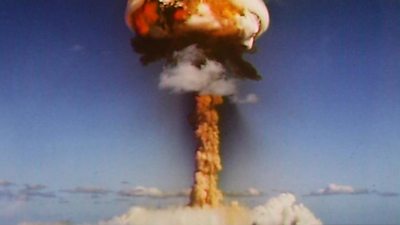The testing of H-bombs by America, the Soviet Union and Britain in the two decades after the Second World War threatened a Cold War conflict of mutually assured destruction. And the ensuing arms race in thermo-nuclear bombs produced a new kind of public fear: one in which everywhere and everyone was on the front-line. In this climate of existential anxiety to what extent could, or should, the ����ý address the moral panic associated with nuclear annihilation?
The detonation of the United Kingdom’s first megaton fusion device, known as GRAPPLE X, off Christmas Island in 1957, coincided with the setting up of the Campaign for Nuclear Disarmament: CND. And these two events, reflecting the UK’s status as a nuclear military power and vocal public opposition to nuclear warfare, set the tone of the subsequent debate about Britain’s nuclear deterrent strategy.

By this point, the devastating potential of nuclear war had been the focus of British government planning, as part of its civil defence strategy, for some time.
In 1955, a secret British government committee led by Sir William Strath, who had worked on the wartime development of the atomic bomb as part of the Manhattan Project in America, reported to ministers on the theoretical consequences of a nuclear attack on the United Kingdom.
"Hydrogen bomb warfare would be total war in a sense not hitherto conceived. The entire nation would be in the font-line. Life and property would be obliterated by blast and fire on a vast scale. An attack of the size assumed [10 bombs] would unleash an explosive force equivalent to 100 million tons of TNT. This is forty-five times as great as the total tonnage of bombs delivered by all the Allies over Germany, Italy and occupied France throughout the whole of the last war."
For the most part the ����ý, outside of its news and current affairs reporting, had addressed such “end of the world” scenarios with a degree of caution and reticence: perhaps reflecting the concern of a public service broadcaster to avoid giving oxygen to such conflicted debates.
However, by the 1960s, the creative impulse of its own programme-makers to explore major contemporary issues was increasingly being felt at the Corporation. This was the case in documentary television where an array of talent including Ken Russell, John Schlesinger, John Berger, Patrick Garland, and Richard Cawston began to articulate a range of new perspectives on British society through film. One such person was Peter Watkins, described by Cawston as...
A man of enormous talent... He could make films in the same sort of way that Mozart could compose music.
Recruited by the then Head of Documentaries, Huw Wheldon, Watkins arrived at the ����ý with a clear sense of purpose: to make a film about the consequences of a nuclear attack on Britain – The War Game.
Watkins’ directorial style of blending the narrative structure, filming techniques and editing of documentaries with intimate dramatized scenes – what we might consider today as “docudrama” – was both highly original at the time and immensely compelling as a viewing experience.
This had been evident with his debut production for the ����ý, Culloden, about the decisive battle of the mid-Eighteenth Century Jacobite rising, which won a BAFTA in 1965. On the back of this success, Wheldon agreed to allow Watkins to start work on The War Game although, as Wheldon explains in this newly released interview from the ����ý Oral History Collection, he had major misgivings about commissioning such a “political hot potato”.
Wheldon’s concerns with the first full cut of The War Game created an impasse between himself and an uncompromising Watkins. At this point, the question of whether the film was suitable for broadcast was referred to the Director-General, Hugh Carleton-Greene, and the Chairman of the ����ý Lord Normanbrook.
As Carleton-Greene later noted, it was concern with the effect such a shocking programme would have on the lonely, the aged and the depressed or disturbed that led to the decision to prevent it from being broadcast.
Is this, then, the story of The War Game? A bold attempt, by a brilliant director, to imagine the consequences of a nuclear attack on Britain, which transgressed the ����ý’s unwritten rules concerning audience tastes? Without doubt, the potential to shock and offend audiences was a pre-eminent consideration in terms of the ����ý’s editorial policy, but it was not the only consideration the ����ý took into account when banning of The War Game.
As Hugh Carleton-Greene pointed out the Chief Assistant to the Director-General, Oliver Whitley, took a different view of the merits of the programme. In part, this was based on his conviction that showing what was likely to happen after a nuclear attack was so important “that the ����ý’s overriding duty really ought to have been to broadcast it come hell or high water”.
It was also based on his first-hand experience of the decision to ban the programme: taken by Lord Normanbrook who, in his previous career as a senior civil servant, had been the Cabinet Secretary between 1947 and 1962 and was a key architect of Britain’s Cold War machinery of government.
For Whitley, the attitude of the ����ý’s Chairman’s in this matter was shaped by a career in government service. And it is perhaps no surprise that a programme attempting to expose the reality of a nuclear attack and, by inference, the inability of government to control its consequences, might have been banned on the basis of reasons other than editorial taste.
This was indeed the case as is revealed in an interview with the Director of Radio at the time and a member of the Board of Management, Frank Gillard, in which he explains the lengths to which Lord Normanbrook went to seek guidance on the suitability of the programme from government departments.
By convening a screening for government representatives, including the Cabinet Office, the Ministry of Defence, the Chiefs of Staff and the Postmaster General, Normanbrook invited political considerations into the ����ý’s decision-making process. For someone who had been privy to the most delicate parts of Britain’s “secret state”, and had knowledge of the devastation and chaos that would result from nuclear war, this was not perhaps as incongruent as it would have seemed to seasoned programme-makers.
As it was, the editorial concerns about the programme over taste provided the necessary cover for the editorially independent ����ý to argue its case. But it raises the question of whether the film was really banned from within, by the ����ý, or from without, by the government. And where the line is drawn between public service and censorship. For the Postmaster-General at the time, Anthony Wedgwood Benn, here in conversation with Frank Gillard, it was a clear case of the latter.
The story of The War Game does not stop there, however. The instincts of Huw Wheldon and Richard Cawston, that Peter Watkins’ version was, despite their misgivings, a brilliant film led them to approach the to seek a cinematic release for the work. Here, they argued, paying customers would have some idea of what they were about to encounter, no matter how shocking or unsettling.
It premiered at the National Film Theatre on London’s Southbank in April 1966 and a limited release followed. In 1967, The War Game won the Academy Award (Oscar) for Best Documentary Feature and eighteen years later, in 1985, it was eventually broadcast on terrestrial television by the ����ý.
Content Warning
The video below contains scenes which some viewers may find disturbing.
The War Game is a frightening film, and drew public attention to Peter Watkins’ vision of the grim realities that might await us after a nuclear attack. As we can see, the ����ý’s decision to initially commission the programme and then to ban it, was a conflicting mixture of both editorial bravery and conservatism.
Yet, these impulses are instructive in understanding the bi-polarity inherent to the ����ý’s understanding of broadcasting in the “national interest”. In programming terms, this meant giving expression to the creative forces at the disposal of the ����ý, for the benefit of audiences.
In institutional terms, governed by a and constitutionally responsible to Parliament, the ����ý saw itself as a custodian of the best interests of the nation, which in this case it judged to mean not panicking the public about the hopelessness of our survival in a nuclear war.
Written by Dr. Alban Webb, University of Sussex.
Related links
-
The War Game (UK only) The controversial, Oscar-winning drama-documentary depicts the consequences of a nuclear attack on Britain.
-
Archive on 4: The War Game Files Michael Apted presents previously secret Cabinet Office files that reveal how the ����ý director general and its chairman consulted with Whitehall to ban 1965 film The War Game.
-
Ross Davies debates whether the 1984 ����ý drama Threads was the scariest TV show ever made.

